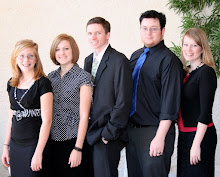
An essay by Gregory Mantsios seems to be a popular curriculum flint with which to fire class discussion on American social distinctions. Titled, “Class in America - 2006”, Mantsios asserts that many fundamentally cherished beliefs about individual opportunity in America are nothing more than ignorant and oppressive myths. I found his laborious attempt to dismiss classic “get ahead” American values of hard work, sacrifice and persistence - insulting.
He initiates the conversation by pointing out that people in the United States avidly avoid speaking about class. We are more likely to identify with our career or industry, race, ethnic group or geographic location - and I will add, religious affiliation. Yes, thank goodness, we do. It would seem so Bourgeoisie to ever refer to the “ruling class”, “elite” or “wellborn”, and definitely poor taste to ever say, “lower class”.
Yet virtually everyone talks about distinctions that make us noticeably different from each other. Granted, not all of them qualify academically as "class" ranking per se, but they are hardly off-limits to the American experience. What school or corporate lunch room has not naturally segregated itself without the slightest outside influence to do so? Do we not respond to people, almost innately - who are wearing a uniform of some kind (which is designed to identify them instantly from a distance), whether it be housekeeper, police or kitchen help? Who hasn't noticed, mentioned to a friend or sent a camera phone picture of those who are physically notable (obese, tattoos, piercings, fashion, etc.)? (I personally have never photographed anyone like that but you know what I mean - think YouTube).
We may not use the word "class", but we are indeed all about constantly ranking ourselves and others as to where we fit in. It is more an issue of the human condition, or human nature to compare and posture and test each other for rank or position than it is the ugly, subversive arm of an individual "oppressive" government.
The economic disparity in America is crazy, of course.  Our sick fascination with brilliantly debauched personal ethics is evidenced in reality shows like “Bridezilla”, “Sweet 16”, “The Real Housewives of Orange County” and “You’re Cut Off”. Americans love to hate people with money behaving badly. But what we hate worse is someone else telling us what to do with our money. Mantsios, however, tries to support his argument for forced wealth redistribution by comparing three profiles of persons representative of the three unspoken American class distinctions: upper class, middle class and lower class. He complains at length that 1% of America holds 30% of the wealth.
Our sick fascination with brilliantly debauched personal ethics is evidenced in reality shows like “Bridezilla”, “Sweet 16”, “The Real Housewives of Orange County” and “You’re Cut Off”. Americans love to hate people with money behaving badly. But what we hate worse is someone else telling us what to do with our money. Mantsios, however, tries to support his argument for forced wealth redistribution by comparing three profiles of persons representative of the three unspoken American class distinctions: upper class, middle class and lower class. He complains at length that 1% of America holds 30% of the wealth.

Personally, it does not bother me that there is an Oprah, Donald Trump or Bill Gates or two out there. Someone needs to assume the risk to build buildings, run corporations and move the market. Those kinds of people also hire a lot of other people and generate educational scholarship funds and support a wide variety of philanthropic and research projects. Their enormous success is a motivation to all the little people. Who would enter a race in the Olympics if they were also assured that every single entrant would win?
Michael Jordan was born to middle class parents in Brooklyn, New York. He quit the NBA after his first year as a rising star to return to North Carolina State to finish his degree. He continued his rise to celebrity status as an athlete, and made millions. Jordan’s name is respected and recognized for his athletic stardom and his business savvy. He invested wisely, and his name is associated with successful business ventures as well as numerous scholarships and charitable causes.
Mike Tyson was born to lower middle class parents in Brooklyn, New York. Abandoned by his father as a toddler, he grew up in crime-plagued Brownsville, New York, and was arrested 38 times by the time he was 13. Eventually was given to his boxing trainer who became his legal guardian. His rise to international celebrity also earned him millions. Yet his name today is a national joke. Tyson had trouble with the law, wasted his fortune on bad investments, women and common gambling addictions.
Both men transcended their class status by hard work, sacrifice and persistence. But status in America is static; it often reflects a state of mind. Tyson was unable to shake the ghetto mind-set.

Likewise, I found Mantsios’ opening paragraph under "Spheres of Power and Oppression" to be especially flamboyant. He states: "When we look at society and try to determine what it is that keeps most people down - what holds them back from realizing their potential as healthy, creative, productive individuals - we find institutional forces that are largely beyond individual control. Class domination is one of these forces."
What organized society does not have hierarchy? Without some form of 'elite' status among us - those who are given authority to regulate or administer - how else does society protect itself from sheer chaos?
Mantios' essay attempts to bust the myth that we are a middle-class nation. He claims the American middle class today holds only a very small share of the nation's wealth. Yet he offers conflicting statistics that basically identify 40% of the U. S. belongs to the middle class. How is 40% of anything insignificant? If his figures are accurate, of the 24 students in my college class, three of us should be living in poverty, or a family making less than $19,000 a year, and qualify as "lower class".
I conducted a survey. The survey was distributed to three classes at Phoenix College. Our class (English 101) and two 102 English classes. I asked students to choose which class distinction they identify with. But I also asked them if they had safe shelter? Running water? Appliances? Electricity? Did they own a cell phone? DVD player? Digital camera? Personal computer? A car? I asked if they had shoes and clothes?

The survey asked them to mark how much time they devote to leisure activities in a week, if they had a reasonable expectancy to eat at least one meal a day every day? Did they have access to emergency care at a local hospital, and clean, safe food/goods at a nearby grocery store? I asked them if they are free to worship as they choose? I also asked them to list alternative strategies (if any) with which they might negotiate around limitations based on gender. Finally, I asked them how familiar they were with how to utilize and/or take advantage of methods to acquire information and resources that could be of benefit to them, and to rate how much their personal hopes and dreams they believe are limited or unobtainable because of their ethnicity, gender, father's name, career, religion, language or physical appearance. Only one survey returned with the last question marked as anything other than "not limited".
My point was this: America's poverty does not look like the world's poverty. Scooping water from a puddle is poverty. Having no shoes is poverty. Waiting in line all day for a bowl of gruel is poverty.

Of course we have problems in America. Of course we must be diligent as a society to seek improvements for all our citizens. However, to claim our issues are locked into oppressive and immovable class barriers is absolutely not justified. If our middle class is a glut of luxury compared to most of the world, then we ought to be much, much more grateful than we are. We ought to be about personally contributing to our communities with our time, talents and yes, tried and true distinctly American ethics of hard work, sacrifice, and persistence.
Professor Mantsios arrogantly condemns his fellow Americans with his concluding statement: "...as a society we tolerate unconscionable injustice..." if we fail to demand (or "require" is the word he chose) a "radical redistribution of wealth and power." I wonder if the good Professor feels qualified to tell Michael Jordan what he should do with his money? Who among us is willing to give one of our cars away because there might be someone else who doesn't have one? And why he believes waiting for the Government to do anything is a reasonable solution - is beyond me.
We might as well wait for Jesus to come and do it right.









1 comment:
We cant really classify people into those 3 main classes into today's typical American families. Everything is too diverse to categorize. But it's true, we judge people all the time. We definitely shouldn't be proud of this but we do it nevertheless. Pride is the main reason we judge. Whether it be to make yourself feel better or put others down it's not a good thing. We take pride when we say "I'm so glad I'm not in there situation". Or we take on another form of pride known as envy when we look at things from the opposite side, "Man i wish I was as fortunate as them". We are all tested whether we're rich, poor, or just "normal", if that even exists. It's important to focus on yourself and those you're close with. But we are all one big world and we need to help each other out as well.
Concerning the television shows, those are just funny to make fun of but not to actually watch as if it matters. They're a total joke! Another form of that is magazines. The news isn't who's wearing the new gucci bag it's wear the latest earth quake has struck. Therefore it's not found in a newspaper, with the exception of the church magazines, it's found in a thing that is "black and white and read all over".
Waiting for the Government to fix things doesn't even make sense. We are the ones that control the government! Wake up Mantsios.
The only class that actually matters is the one you put yourself in, and if you don't like the sound of that class, change it! Make yourself that much better. Michael Jordan is a perfect example of that. All you have to do is pick a goal and go for it. The sky is the limit. Don't forget, life is what you make it.
Post a Comment